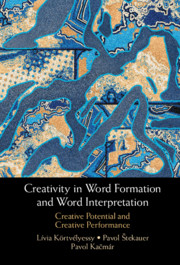Book contents
- Creativity in Word Formation and Word Interpretation
- Creativity in Word Formation and Word Interpretation
- Copyright page
- Contents
- Figures
- Tables
- Acknowledgements
- 1 Introduction
- 2 On the Notion of Creativity
- 3 Theoretical Foundations of Our Research
- 4 Methodological Principles
- 5 Research
- 6 Conclusions
- References
- Author Index
- Subject Index
2 - On the Notion of Creativity
Published online by Cambridge University Press: 20 January 2022
- Creativity in Word Formation and Word Interpretation
- Creativity in Word Formation and Word Interpretation
- Copyright page
- Contents
- Figures
- Tables
- Acknowledgements
- 1 Introduction
- 2 On the Notion of Creativity
- 3 Theoretical Foundations of Our Research
- 4 Methodological Principles
- 5 Research
- 6 Conclusions
- References
- Author Index
- Subject Index
Summary
Our research pursues an answer to the question of the influence of the general creative potential upon the creative performance in coining and interpreting new complex words. This chapter presents fundamental views, theories, and principles of the concept of creativity and because creative potential has been studied and evaluated by various psychological methods, we provide a general overview of various aspects of approaches to creativity from the psychological point of view. Attention is devoted to various methods used for the study and evaluation of creativity. Special focus is on the Torrance Test of Creative Thinking because it is crucial to our research. This is followed by a critical overview of various approaches to the concept of linguistic creativity, and more specifically, to word-formation and word-interpretation creativity. This chapter introduces our approach that relies on (i) an onomasiological theory of word-formation (ii) an onomasiological theory of meaning predictability, and (iii) a theory of competition in word-formation and word-interpretation.
Keywords
- Type
- Chapter
- Information
- Creativity in Word Formation and Word InterpretationCreative Potential and Creative Performance, pp. 9 - 36Publisher: Cambridge University PressPrint publication year: 2022

